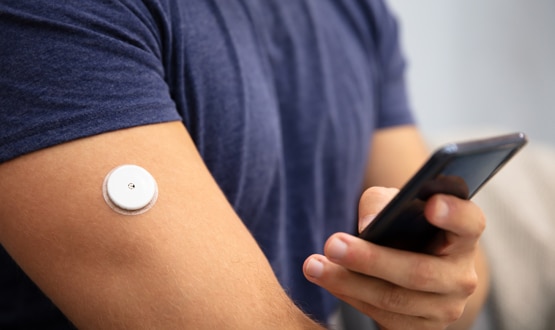Could Apple be working on its own glucose monitoring technology?

Suffering diabetics are faced with the task of continuous monitoring and managing a number of lifestyle-related factors.
Last month, CNBC reported that Apple has a group of biomedical engineers working on non-invasive and continuous glucose monitoring – featuring sensors that would monitor blood sugar levels.
Fueling speculation of the giant tech company’s interest in the space comes after its CEO Tim Cook was spotted wearing a glucose monitoring device attached to his Apple Watch, according to a CNBC report.
It monitors how his blood sugar responds to factors like food and exercise.
Earlier this year Cook was at the University of Glasgow – where he received an honourary degree – talking to students about his interest in glucose monitors and Apple’s potential in health care.
He also spoke about the struggles faced by people with diabetes.
In the UK alone, an estimated 4.5 million people are living with diabetes, according to Diabetes UK 2016 report.
Since 1996, the number of people diagnosed with diabetes in the UK has more than doubled from 1.4 million to almost 3.5 million.
In March this year, a Type 2 diabetes app, that received nearly £1 million in funding over three years, was rolled out in clinical commissioning groups across England. Locations included Waltham Forest, Central London, West London and South Manchester.
The app, which can be used on a smartphone or tablet, provide patients with coaching and exercise programmes, based on well-grounded research, and provides access to a professional coach.
The Salford Royal NHS Foundation Trust also dabbled into the wearables industry.
In March this year it signed a contract with Validic, a US data platform supplier, to upload patient generated wearable data to its electronic patient record.
According to Forbes, the wearable tech market is tipped to be worth $US34 billion by 2020.




3 Comments
glucose is interesting. though there are some interesting devices out there already like the libre pro – which arent that well used/known about – perhaps apples thing will be publicity. as a doc – im slightly worried about loads of worried well turning up with slightly raised sugars that mean nothing..
personally i think there is a lot more than could be done with ECGs and heart problems and i struggle to understand why they arent pursuing that.
Although, interestingly, there is only one person based in the UK working on the Health team. Everyone else is in Cupertino.
i-nsulin
Comments are closed.